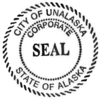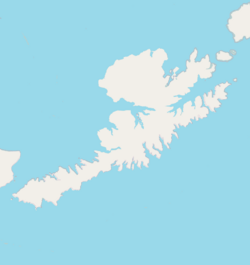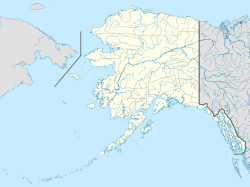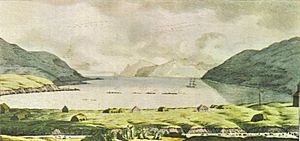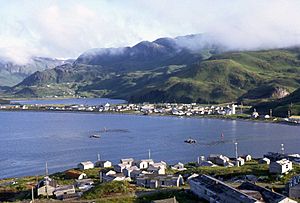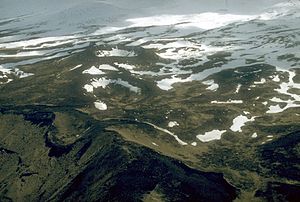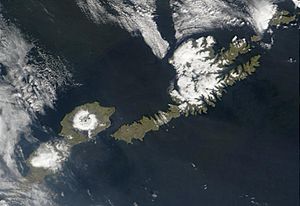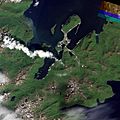Unalaska, Alaska facts for kids
Quick facts for kids
Unalaska
Iluulux̂
|
|||
|---|---|---|---|
| City of Unalaska | |||
|
Hilltop view of Unalaska
Crab boats moored in Dutch Harbor in 2009
U.S.C.G. C-130 Hercules on the apron at Dutch Harbor Airport
View from a hill on Amaknak Island
View from the shore at sunrise
Unalaska Island and Iliukliuk Harbor
|
|||
|
|||
| Country | United States | ||
| State | Alaska | ||
| Census Area | Aleutians West | ||
| Incorporated | March 3, 1942 | ||
| Area | |||
| • Total | 210.89 sq mi (546.20 km2) | ||
| • Land | 102.21 sq mi (264.73 km2) | ||
| • Water | 108.68 sq mi (281.47 km2) | ||
| Elevation | 13 ft (4 m) | ||
| Population
(2020)
|
|||
| • Total | 4,254 | ||
| • Density | 41.62/sq mi (16.07/km2) | ||
| Demonym(s) | Unalaskan | ||
| Time zone | UTC−9 (Alaska (AKST)) | ||
| • Summer (DST) | UTC−8 (AKDT) | ||
| ZIP code |
99685
|
||
| Area code | 907 | ||
| FIPS code | 02-80770 | ||
| GNIS feature ID | 1419424 | ||
The City of Unalaska (called Iluulux̂ by the Aleut people and Уналашка in Russian) is a very important town in the Aleutian Islands. These islands are part of Alaska, a state in the United States. Unalaska is located on two islands: Unalaska Island and Amaknak Island.
The Aleut (also known as Unangan) have lived here for thousands of years. They were the first to name the island "Ounalashka," which means "near the peninsula." This name is still used by the local native corporation today.
In 1759, Russian fur traders arrived in Unalaska. For a long time, the community was made up of Aleuts, Russians, and their mixed-heritage descendants. During World War II, many people moved to the Aleutian Islands. This was because the islands were in a very important location for the war.
Most of the city's port facilities are on Amaknak Island. This area is better known as Dutch Harbor. It is one of the biggest fishing ports in the U.S. for the amount of fish caught. Dutch Harbor is part of Unalaska and is connected by a bridge. Many people in Unalaska live on Amaknak Island.
Because of the strong fishing industry, Unalaska is also home to many bald eagles. Hundreds of these birds are attracted to the area by human activities.
Contents
History of Unalaska: A Timeline
The Aleut were the first to live on Unalaska Island. They called it "Ounalashka," meaning "Near the Peninsula." They had a well-developed society long before Russian fur traders arrived.
Early Encounters and Conflicts (1759-1778)
In 1759, the first Russian group, led by Stepan Glotov, came to Unalaska. They traded for three years. Between 1763 and 1766, there was a conflict between Russian traders and the Aleut people. The Aleuts destroyed four Russian ships and killed many hunters.
A Russian fur trading post was set up temporarily in the 1760s. It became a permanent post in 1774. Later, it became part of the Russian-American Company. In 1778, Captain James Cook met a navigator named Gerasim Izmailov here.
In 1788, Spanish explorers also visited Unalaska. They claimed the island for Spain, calling it Puerto de Dona Marie Luisa Teresa.
Russian Influence and Population Changes (1825-1867)
In 1825, the Russian Orthodox Church of the Holy Ascension was built in Unalaska. The first priest, Ivan Veniaminov, created the first Aleut writing system. He also translated religious texts into the Aleut language.
Between 1836 and 1840, diseases like measles and chicken-pox greatly reduced the population. By the end of this time, only a few hundred Aleuts lived in Unalaska. On October 18, 1867, the United States bought Alaska. This made Unalaska part of the U.S. territory.
American Era and World War II (1880-1950s)
In 1880, the Methodist Church opened a school and a clinic in Unalaska. The Gold Rush (1899-1905) brought many ships through Dutch Harbor.
More epidemics, like the Spanish flu in 1919, continued to reduce the population. In 1940, the U.S. began building up defenses in Dutch Harbor. This led to the creation of the Dutch Harbor Naval Operating Base and Fort Mears, U.S. Army.
On June 3, 1942, Japanese forces attacked Dutch Harbor. This was part of the Aleutian Islands campaign during World War II. After the attack, most native residents were moved to camps in Southeast Alaska. Conditions in these camps were poor, and many people died.
Fishing Industry and Modern Times (1950s-Present)
In the 1950s, Unalaska became a center for the Alaskan king crab fishing industry. By 1978, it was the largest fishing port in the United States. A decline in king crab harvests in 1982 led to a shift towards bottom fishing.
Since 2005, the TV show Deadliest Catch on the Discovery Channel has featured fishermen based in Dutch Harbor.
Geography and Climate
Unalaska covers about 212 square miles (546 square kilometers). About half of this area is land, and the other half is water.
Makushin Volcano: A Nearby Giant
Makushin Volcano is on Unalaska Island. It is about 5,691 feet (1,735 meters) tall. You can't quite see it from the town of Unalaska. However, on clear days, you can see steam rising from its top. If you climb a smaller hill nearby, you can get a good view of the snow-covered volcano.
Ancient Discoveries: Paleontology
In 2015, scientists made an exciting discovery. They found fossils of giant, tusked, four-legged marine mammals. These fossils were found during the building of a school. These unique animals lived near the shore and belong to an extinct group called Desmostylia. They might be related to elephants or manatees.
Unalaska's Weather: Rainy and Mild
Unalaska has a subpolar oceanic climate. This means it has mild temperatures and lots of rain. Fog is also very common, even when it's not raining. Summers are cooler than in other parts of Alaska, but winters are similar.
The average yearly temperature in Unalaska is about 40.9°F (4.9°C). January is the coldest month, averaging 32.5°F (0.3°C). August is the warmest, averaging 53.3°F (11.8°C). Unalaska gets about 225 rainy days a year. This makes it one of the rainiest places in the United States.
| Climate data for Dutch Harbor, Unalaska, Alaska | |||||||||||||
|---|---|---|---|---|---|---|---|---|---|---|---|---|---|
| Month | Jan | Feb | Mar | Apr | May | Jun | Jul | Aug | Sep | Oct | Nov | Dec | Year |
| Record high °F (°C) | 58 (14) |
54 (12) |
61 (16) |
58 (14) |
60 (16) |
73 (23) |
75 (24) |
81 (27) |
74 (23) |
65 (18) |
57 (14) |
59 (15) |
81 (27) |
| Mean daily maximum °F (°C) | 36.8 (2.7) |
37.3 (2.9) |
38.6 (3.7) |
40.9 (4.9) |
46.1 (7.8) |
51.7 (10.9) |
56.8 (13.8) |
58.9 (14.9) |
54.0 (12.2) |
47.3 (8.5) |
42.6 (5.9) |
39.0 (3.9) |
45.8 (7.7) |
| Daily mean °F (°C) | 32.5 (0.3) |
32.5 (0.3) |
33.5 (0.8) |
36.2 (2.3) |
41.4 (5.2) |
46.8 (8.2) |
51.4 (10.8) |
53.3 (11.8) |
48.8 (9.3) |
42.3 (5.7) |
37.4 (3.0) |
34.7 (1.5) |
40.9 (4.9) |
| Mean daily minimum °F (°C) | 28.1 (−2.2) |
27.6 (−2.4) |
28.3 (−2.1) |
31.4 (−0.3) |
36.7 (2.6) |
41.9 (5.5) |
46.0 (7.8) |
47.7 (8.7) |
43.5 (6.4) |
37.2 (2.9) |
32.1 (0.1) |
30.3 (−0.9) |
35.9 (2.2) |
| Record low °F (°C) | −8 (−22) |
0 (−18) |
2 (−17) |
−5 (−21) |
15 (−9) |
30 (−1) |
21 (−6) |
30 (−1) |
19 (−7) |
2 (−17) |
8 (−13) |
5 (−15) |
−8 (−22) |
| Average precipitation inches (mm) | 7.28 (185) |
6.35 (161) |
5.40 (137) |
3.46 (88) |
3.98 (101) |
2.48 (63) |
2.19 (56) |
2.69 (68) |
5.21 (132) |
7.17 (182) |
6.76 (172) |
7.89 (200) |
60.86 (1,545) |
| Average snowfall inches (cm) | 23.8 (60) |
20.4 (52) |
16.5 (42) |
6.6 (17) |
0.2 (0.51) |
0 (0) |
0 (0) |
0 (0) |
0 (0) |
0.5 (1.3) |
6.4 (16) |
17.1 (43) |
91.5 (231.81) |
| Average precipitation days (≥ 0.01 inch) | 21 | 20 | 20 | 17 | 17 | 14 | 13 | 14 | 18 | 23 | 23 | 23 | 223 |
| Source: WRCC | |||||||||||||
Population and People
| Historical population | |||
|---|---|---|---|
| Census | Pop. | %± | |
| 1880 | 406 | — | |
| 1890 | 317 | −21.9% | |
| 1900 | 428 | 35.0% | |
| 1910 | 281 | −34.3% | |
| 1920 | 299 | 6.4% | |
| 1930 | 226 | −24.4% | |
| 1940 | 298 | 31.9% | |
| 1950 | 173 | −41.9% | |
| 1960 | 218 | 26.0% | |
| 1970 | 342 | 56.9% | |
| 1980 | 1,322 | 286.5% | |
| 1990 | 3,089 | 133.7% | |
| 2000 | 4,283 | 38.7% | |
| 2010 | 4,376 | 2.2% | |
| 2020 | 4,254 | −2.8% | |
| source: | |||
Unalaska first appeared on the U.S. Census in 1880. It was listed as the village of Iliuliuk. Most of its residents were Aleut or of mixed Russian and Aleut heritage. The town was officially formed in 1942.
Who Lives in Unalaska? (2020 Census)
| Race / Ethnicity (NH = Non-Hispanic) | Pop 2000 | Pop 2010 | Pop 2020 | % 2000 | % 2010 | % 2020 |
|---|---|---|---|---|---|---|
| White alone (NH) | 1,780 | 1,473 | 1,326 | 41.56% | 33.66% | 31.17% |
| Black or African American alone (NH) | 157 | 287 | 221 | 3.67% | 6.56% | 5.20% |
| Native American or Alaska Native alone (NH) | 323 | 260 | 182 | 7.54% | 5.94% | 4.28% |
| Asian alone (NH) | 1,307 | 1,397 | 1,483 | 30.52% | 31.92% | 34.86% |
| Pacific Islander alone (NH) | 24 | 95 | 221 | 0.56% | 2.17% | 5.20% |
| Other race alone (NH) | 4 | 5 | 8 | 0.09% | 0.11% | 0.19% |
| Mixed race or Multiracial (NH) | 137 | 193 | 219 | 3.20% | 4.41% | 5.15% |
| Hispanic or Latino (any race) | 551 | 666 | 594 | 12.86% | 15.22% | 13.96% |
| Total | 4,283 | 4,376 | 4,254 | 100.00% | 100.00% | 100.00% |
In 2020, Unalaska had 4,254 people. The population includes many different groups. About 31% were White, 35% Asian, and 14% Hispanic or Latino.
A Look at the 2010 Census
In 2010, Unalaska had 4,376 people. There were 927 households, with 34% of them having children under 18. The average household had 2.5 people.
The population was quite diverse. About 39% were White, 33% Asian (many from the Philippines), and 15% Hispanic or Latino. The median age was 40.7 years. This means half the people were older than 40.7 and half were younger.
Economy and Fishing Industry
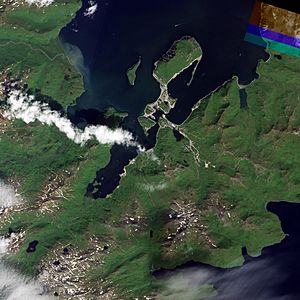
The port of Unalaska / Dutch Harbor is very important for fishing. It is the main base for the Bering Sea king crab fishery. This is why the TV show Deadliest Catch often features Dutch Harbor. The show highlights the fishing boats and local places like the pub.
Dutch Harbor has been the largest fishing port in the United States for many years. This is based on the amount of seafood caught. Until 2000, it also ranked first for the total value of its catch.
Fish Oil Biodiesel Project
Unalaska / Dutch Harbor has a special project. They are making fish oil biodiesel from the local fish processing industry. This project works with the University of Alaska Fairbanks. Shipping fish oil elsewhere is often too expensive. Also, communities in Alaska rely heavily on diesel for power. The local factories produce millions of gallons of fish oil each year. This project helps use it locally.
Education in Unalaska
Unalaska operates its own schools. The Unalaska City School District had 418 students in 2018–2019. Students attend Eagle's View Elementary School (pre-K to 4th grade) and Unalaska Jr/Sr High School (5th to 12th grades).
The Unalaska City School District has been recognized as one of the best in the U.S. It consistently scores high on state exams. In 2006, it received awards for its school board and superintendent. Unalaska Headstart also provides education for younger children.
College Opportunities
The University of Alaska Fairbanks has a campus in Unalaska. It is called the University of Alaska, Aleutian Pribilof campus. This college offers regular classes and online courses. It also provides workshops and allows high school students to earn college credits. About 11% of Unalaska residents aged 25 and older have a college degree.
Transportation in Unalaska
Unalaska is connected to the rest of Alaska by air. The Unalaska Airport has a paved runway. Daily flights go to and from Anchorage. There is also a seaplane base. In 2002, the airport was renamed "Tom Madsen Airport" after a local pilot.
The Alaska Marine Highway ferry system visits Unalaska every two weeks from April to October. Unalaska has ten major docks. Three of these are run by the city. A refurbished World War II dock now offers ship repair services.
Unalaska has about 7 miles (11 km) of paved roads. The total road length is about 38 miles (61 km). The busiest roads are Airport Beach Road, 5th Street, and Broadway Avenue. About 3,000 cars use these roads daily.
Churches in Unalaska
Unalaska has several churches:
- Russian Orthodox Church of the Holy Ascension of Christ, built in 1825, is the oldest Russian church in the United States.
- Saint Christopher-By-The-Sea Catholic Church
- United Methodist Church-Unalaska
- Unalaska Reformed Church Southern Baptist Convention
- The Church of Jesus Christ of Latter-day Saints
International Connections
Unalaska has a special connection with Petropavlovsk-Kamchatsky, Russia. They have been twin cities since 1990.
Images for kids
-
Satellite view of Dutch Harbor.
See also
 In Spanish: Unalaska para niños
In Spanish: Unalaska para niños
 | Aaron Henry |
 | T. R. M. Howard |
 | Jesse Jackson |








